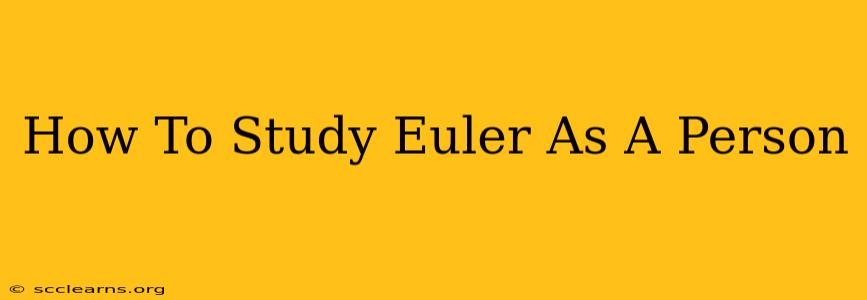Leonhard Euler. The name conjures images of complex equations and groundbreaking theorems. But to truly understand Euler's impact, we need to go beyond the mathematics and delve into the person behind the genius. This isn't just about memorizing formulas; it's about understanding the life, times, and context that shaped one of history's greatest mathematicians.
Understanding Euler's Life: A Timeline of Genius
To effectively study Euler as a person, chronologically exploring his life is crucial. This approach provides context for his mathematical breakthroughs and reveals the human element often missing from textbook biographies.
Early Life and Education (1707-1727):
- Family Background: Research Euler's family, their social standing, and the influence they had on his upbringing. This provides insight into his early exposure to mathematics and the encouragement he received.
- Education at the University of Basel: Explore his education, his mentors (like Johann Bernoulli), and the academic atmosphere of the time. Understand what educational resources were available and how they contributed to his development.
- Early Works: Investigate his early publications and the problems he tackled. Analyze what made these works significant, not only in mathematical terms but also in terms of his developing style and approach.
Years in St. Petersburg (1727-1741) and Berlin (1741-1766):
- The St. Petersburg Academy: Investigate the Academy's role in fostering mathematical research and the challenges Euler faced working within this institution. Examine the collaborations he fostered and the rivalries that may have existed.
- The Berlin Academy and Frederick the Great: Analyze his relationship with Frederick the Great. Explore how this relationship impacted his work and his personal life. Understand the political and social climate of the time and its influence on his career.
- Major Mathematical Contributions: Correlate his major works during this period with the context of his life. Did specific events or circumstances influence his research directions?
Return to St. Petersburg and Later Life (1766-1783):
- Challenges and Triumphs: Explore the challenges he faced in his later years, including his declining eyesight and the political climate of Russia. Despite these challenges, he continued to produce significant mathematical contributions.
- Family Life: Explore his family life, including his children and their influence on him. This will provide a more complete picture of the man beyond the mathematics.
- Legacy: Analyze Euler's lasting influence on mathematics and science, considering his impact on subsequent generations of mathematicians and the continuing relevance of his works.
Beyond the Dates: Exploring Euler's Personality
Studying Euler's life requires moving beyond simple biographical details. We must also attempt to understand his personality and the way he approached mathematical problems.
- His Work Habits: Analyze his prodigious output. How did he manage to produce so much work? What were his methods and strategies?
- His Approach to Problem Solving: Examine his problem-solving techniques. What were his strengths and weaknesses? Did he have a preferred approach?
- His Collaborations and Rivalries: Explore his relationships with other mathematicians. How did these interactions influence his work? Did he have any significant rivals?
Resources for Studying Euler as a Person:
- Biographies: Several biographies offer detailed accounts of Euler's life and work. Look for biographies that go beyond simply recounting his mathematical achievements and explore the human aspects of his life.
- Primary Sources: Explore Euler's letters and personal writings to gain insights into his thoughts, feelings, and motivations.
- Historical Context: Research the historical context of Euler's life, including the scientific, political, and social conditions of his time.
By approaching the study of Leonhard Euler in this multifaceted way – chronologically, personally, and contextually – you'll gain a far richer and more complete understanding of this remarkable individual and his lasting contributions to mathematics and the world. You’ll move beyond the equations and see the human being who created them.

